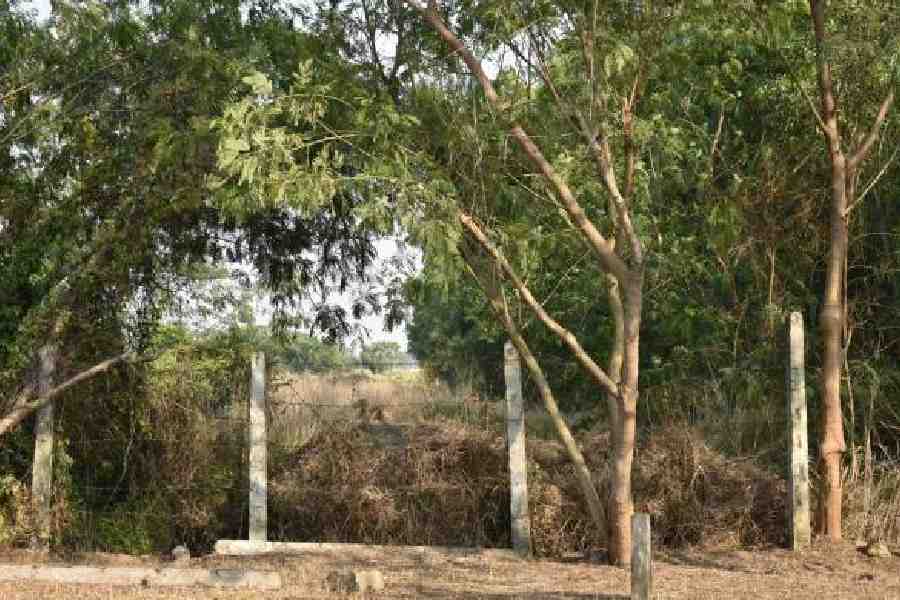I live behind barbed wire and a tall gate but I am still scared. I live surrounded by the enemy, desperate for a piece of me. There’s one peeping over my shoulder, another camping on my doorstep, capturing what belongs to me by incremental inches. Then there is the enemy within, ready to bow down to the shine of money. I am a cooperative farm and this is my story.
It may be hard to believe but only a few years ago, I was queen of all I surveyed, a vibrant patchwork of greens richly tended with mahogany trees guarding the perimeter. For most of the 40 people who jointly own me, I was an aspiration come true — their own patch of green near Tagore’s own country, Santiniketan. I admit I was proud for I was much loved. Every winter, families came to visit and for a day the air was full of the whisper of dreams and sighs of contentment.
This was in direct contrast to the paddy fields around that were increasingly being left fallow. Farming was no more a profitable business; it made more sense to sell off the land. It was ironic but the villagers had learnt that lesson from the urban folk who had paid good money to acquire me.
I was born of one man’s dream to give back to society. An officer in a public life insurance company, he wanted to improve the lot of villagers after he retired. One of the ways he had thought of was to improve farming techniques, change crops and make farming more profitable. He shared the vision with a few colleagues who all wanted to help. A suitable village was chosen. When they came to acquire land, they found it so cheap that many more joined them.
That is how I was born, my name a tribute to the company many of the cooperative members worked at or had retired from. The original plan was to build little bungalows scattered across the fields for members but converting farmland to land for building houses proved impossible so it was put on hold. Meanwhile, a perfect square was fenced in — leaving out awkward little scraps — and saplings that would grow into valuable trees planted along the periphery. Ponds were dug and stocked with fish, land levelled, orchards planted, commercial crops planned, pits dug for composting.
I am both bigger and smaller than the dream that gave birth to me; bigger in the sense of area and smaller in impact. The fact that my founder shared the dream with so many diluted it; most just wanted their own slice of paradise. And no, while I incorporated many of the villagers’ farming processes, I’m afraid they adopted none of mine. But I did adopt a handful of villagers who got regular salaries.
Now I am no more the only employer in the village, a huge chunk of land adjoining me was acquired to set up a private medical college, and attractive daily wages — not to mention the free rice-and-meat lunch — have taken away all but the most dedicated. As I struggle to stay afloat, the brash, politically-connected school dropout building the medical college offers to buy me. When refused, he simply sends a car and a company of goons to pick up my secretary and president who are on their weekly visit. He offers them what he thinks is an amount they cannot refuse. They offer him something he cannot refuse — use of my access to the main road. An uneasy peace is cobbled.
That is how I end up living surrounded by the enemy. The medical college and hospital loom over me and white blocks of hostels and quarters have replaced the surrounding fields. A ribbon of black metalled road — complete with shiny street lights — skirts the green boundary that hides my barbed wire and snakes up to the imposing gate of the medical college. A flyash brick factory backs up to my front boundary; it is slowly inching over unfenced land that belongs to me. Land is big business in Bolpur, even in this village, on the wrong side of the tracks. Land that used to sell for a couple of lakh rupees just a little over a year ago is selling for Rs 16-20 lakh now. Prices had climbed even higher but the recent arrest of a political heavy weight means there are now more sellers than buyers.
The money isn’t, in any case, reaching the cultivators of land, most of whom are share croppers; the more savvy among them have been able to profit. But most farmland was sold off before this huge spike in prices; it is the touts — big and small — who are making a killing.
The pressure to sell me remains high and, of course, not at market price. But it is many times over what the cooperative members invested in me. My current president and secretary — who like to play strategy chess with the enemies — are set to retire soon. Chances are the new ones will be forced to bow to Mammon.











